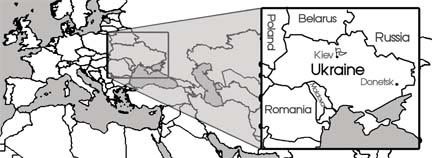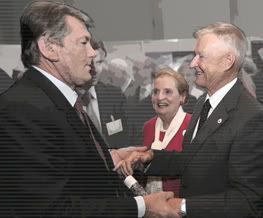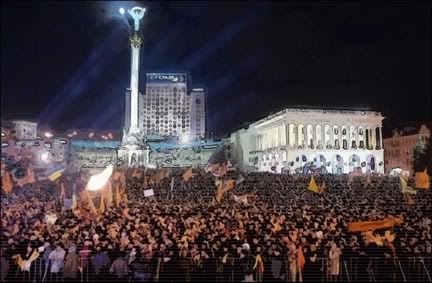 |
A FAMILY PROJECT
Adam Larson
Caustic Logic / Guerillas Without guns
posted 2/17/07
last edited: 2/27/07
In the context of a great game with Russia, the emphasis on Ukraine is understandable - it had been the 2nd most powerful Republic in the USSR and its agricultural heartland. It is the birthplace of the Kievan Rus, the original Slavic culture that Russians trace their own culture back to. It is home to about 10 million ethnic Russians, roughly 20 percent of the entire population there, shares hundreds of miles of common border with Russia, and provides a historically useful buffer space from European invasions, which seem to occur every so often. It has absorbed Napoleonic and Nazi assaults, massive famine, and the Chernobyl disaster and continues to be one of Russia’s biggest trading partners and the place most Russian gas pipelines to Europe run through. Clearly, Ukraine as a geopolitical prize is epic; it’s the biggest thing one can take from Russia besides Russia itself. It seems a stretch to even attempt such a move, but apparently the successes of Belgrade and Tbilisi had left some people feeling very cocky.
American designs on securing Ukraine in the Western camp go back at least to 1997, when Zbigniew Brzezinski, in his book The Grand Chessboard, described Ukraine as one of five key “geopolitical pivots” for control of Eurasia (the others being Azerbaijan, Iran, Turkey, and South Korea). Furthermore, the CFR heavyweight pointed to Ukraine as the final target in extending the “democratic bridgehead” - the contiguous chain of pro-West Democracies like France and Poland - across Europe and right to Russia’s doorstep. An article in Foreign Relations (the official publication of the CFR) explained that this was targeted against Russia: “[T]he heart of the book is the ambitious strategy it prescribes for extending the Euro-Atlantic community eastward to Ukraine and lending vigorous support to the newly independent republics of Central Asia and the Caucasus, part and parcel of what might be termed a strategy of “tough love” for the Russians” Even the magazine noted a bit too much tough in the love: “Brzezinski's test of what constitutes legitimate Russian interests is so stringent that even a democratic Russia is likely to fail it.”
And this tough love ran in the family, with Brzezinski’s son Ian having been an advisor to the newly-independent Ukrainian parliament (director of international security policy at the Council of Advisers) from 1993-94, while also serving as Executive Director of the CSIS American-Ukrainian Advisory Committee. Note that Brzezinski’s tenure ended in the same year Kuchma came to power and turned the country east. Ian has since then continued lobbying from the outside to bring Ukraine into the EU-NATO fold. “Ukraine should be a central component of the West's strategy for Europe.” the younger Brzezinski explained to congress in 1999. But before the adoption could be completed:
“Ukraine will have to make, on its own, the difficult internal decisions necessary to overcome its economic stagnation, its rampant corruption, and its polarized politics. […] After a decade of billions of dollars of Western assistance, the initiative must now come foremost from a Ukraine characterized by aggressive reform.”
Ian was appointed shortly after 9/11 to be the Pentagon’s representative to its European NATO partners and a pivotal part of the decision of who will join next. But his hopes of internal reform started to seem less likely as 2004 dawned with President Kuchma and the PM set to take his place disinterested in such changes and steadily gravitating to the East and Moscow’s sphere.
This is where Viktor Yushchenko, Pora!, dioxin, and the Orange Revolution come in.
After coming to power in Kiev, Yuschchenko played well to Western audiences from day one. When he made his first visit to Washington in early April 2005, he gave a rousing speech to the assembled Congress, receiving a standing ovation as the hero of the Orange Revolution, a white Nelson Mandela who had suffered poisoning, not prison. It is relatively rare, and usually considered a high honor, for a foreign leader to be invited to address a joint session of Congress. CNN ran live coverage, and was sure to have Mark Brzezinski - Ian’s brother – present for analysis. The onetime director for Russian and Eurasian Affairs for the National Security Council and foreign policy advisor to the John Kerry presidential campaign was hopeful that Yushchenko could “show the Ukrainian people that he can not only talk the talk, but walk the walk in terms of essential transformations within Ukraine.”
On a working visit to Poland at the end of August, a still faintly scarred Yushchenko had a photo taken with Ian and Mark’s father, the exalted Zbigniew Brzezinski in the land of his birth. They clasped hands and gazed smilingly at each other as NDI’s Madeleine Albright looked on with a grin. The “democratic bridgehead” had been extended as Zbig had prescribed eight years earlier, and he seemed very happy about the whole affair. The decade-running family project had yielded tangible gains, but the situtaion would soon complicate and the smiles would fade.
 |


No comments:
Post a Comment